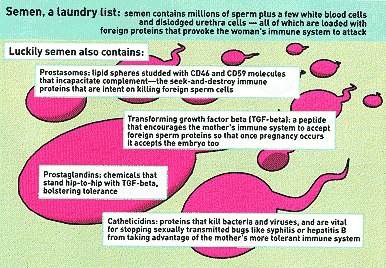 |
Gentle Persuasion
|
 |
Plenty of sex before conception could well be the key to encouraging a woman's body to accept pregnancy.Douglas Fox discovers the unsung virtues of semen.
ONE OF THE great mysteries of the human condition is what
makes us, unlike most other animals, spend such an inordinate amount of time
having sex... and so little time actually getting pregnant. Nor is this a
new phenomenon that came along with contraception. Couples still have plenty
of sex when conception is out of the question either because of the time
of the woman's cycle, or because she is already pregnant or breastfeeding.
But now the mystery of these fruitless bonkings might he solved.
According to reproductive biologists at the University of Adelaide in South
Australia, far from being an exercise in futility, plenty of sex even up
to a full year before conception-helps guard against a litany of ailments.
And Puritans prepare to he shocked-fellatio may work just as well as
missionary-style intercourse.
The disorders, which range from infertility to high blood pressure
during pregnancy, all appear to be linked to the reluctance of the mother's
immune system to accept the fetus and placenta, both of which come armed
with an arsenal of foreign proteins courtesy of the father's genes. Sex,
early and often, and with the intended father; may help overcome that reluctance,
say the Adelaide team.

Clearly, if the mother's immune system remains unconvinced
the consequences will he dire. She may immediately and repeatedly reject
new embryos-in which case, she's infertile. If her immune system takes a
little longer to shun the foreign tissue, she may suffer frequent miscarriages.
And if the rejection is milder still it might only affect the placenta-although
even that can be a disaster. The placenta is the fetus's lifeline, supplying
oxygen and nutrients from the mother's blood. If the placenta fails to grow,
or becomes clogged with angry immune cells, the supply line is cut, and an
underweight baby is the result or even a stillbirth.
Immune rejection can even threaten the mother's life. According
to one still controversial theory, it's the mother's rejection of the placenta
that causes pre-eclampsia, a condition where the mother's blood pressure
soars, in some cases triggering convulsions, coma and death. In this frightening
scenario, fragments of dead placental cells are swept into the mother's
circulation, where they damage vessels, sending her blood pressure skywards.
"It's just different expressions of one underlying theme," says Gustaaf Dekker,
a member of the Adelaide group. "We see patients that have two miscarriages,
then they finally manage to get through their miscarriage period, and they
have preeclampsia, or the placenta detaches and they have a stillbirth at
24 weeks."
A big hand for the little guys
THE secret to what makes us human may lie not in our brains,
but in sperm. Tiny changes in these little cells may have made all the difference
to our evolution. DNA is packed into sperm heads by proteins called protamines,
which help to squash the chromosomes into a tiny space. These proteins were
never considered very important in human development because people thought
their influence stopped shortly after fertilisation. But Caro-Beth Stewart
at the University of Albany, State evolved with lightening speed just as
humans split from the common ancestor of animals like gorillas and chimps,
indicating that the proteins have a much bigger role in human development
than previously thought. |
It's easy to understand why the mother's immune system might
be tempted to annihilate that developing fetus. As if having foreign genes
weren't bad enough, the fetus behaves brutishly during its stay in the womb.
Its placenta invades the wall of the uterus like a cancer, infiltrating a
nearby artery to guarantee steady supplies of oxygen and nutrients. It also
casts millions of foreign cells adrift in the mother's bloodstream, cells
that re-attach and grow in places like her lungs. The mother's immune system
should positively squash those cells like cockroaches, but amazingly in normal
pregnancies it lets them be.
"Acceptance of the conceptus is a much more dynamic affair
than anyone's ever given credit for," says Rodney Kelly, a reproductive
immunologist at the University of Edinburgh, who strongly suspects that the
Adelaide group is on to something. "There's fetal cells in the maternal
circulation, there's plenty of antigen, [so] there's obviously an enormous
amount of immune modulation preventing rejection."
That process of immune modulation begins with the first drop
of semen. You wouldn't suspect it during those dreamy post-coital moments,
but for the next 15 hours or so a woman's cervix is swarming with immune
cells. They swoop in like government agents investigating an alien crash
site-which is essentially what they are doing. They busy themselves collecting
the man's foreign proteins-even entire sperm cells-and lug them back to the
lymph nodes where other immune cells learn to recognise them. Normally those
foreign proteins would end up on the immune system's Most Wanted list: antibodies
would be made against them, and primed to annihilate the sperm next time
they dared to darken their doorstep. But the miracle of sex is that semen
contains not only millions of sperm loaded with foreign proteins, but also
some recently discovered components that tilt a woman's immune response away
from hostility and toward acceptance.
"If there's repeated exposure to that signal," says Dekker,
"then eventually when the woman conceives, her [immune] cells will say, 'we
know that guy, he's been around a long time, we'll allow the pregnancy to
continue."' Of course acceptance of the sperm by the mother's immune system
isn't all that's needed for a straightforward pregnancy. But when things
do go wrong, sperm have the power to provoke a vicious immune response. Following
intercourse, women very occasionally go into anaphylactic shock, an immune
response so severe that breathing can be nigh on impossible, and blood pressure
plummets dangerously low. For these luckless women, just a drop of semen
on a thigh can raise boils. The problem appears to stem from lacklustre attempts
by the woman's immune system to become tolerant to sperm, combined with the
man's semen doing a really bad job of convincing it. In some cases switching
partners is all it takes to solve the problem. And there's other tantalising
evidence of semen's power over the mother's immune response. An analysis
of pre-eclampsia patterns in 1.7 million births from the Medical Birth Registry
of Norway found that certain "dangerous males" are nearly twice as likely
to father a pre-eclamptic pregnancy. These dangerous males carry their high
risk from one female partner to the next.
But these are the rare examples where a man's semen isn't
functioning properly. It was Pierre-Yves Robillard, a neonatologist now at
the Sud Reunion Hospital on Reunion in the Indian Ocean, who showed that
under normal circumstances semen exposure actually helps prevent
pre-eclampsia-evidence that flies in the face of mainstream explanations
for the disorder such as the popular "pantyhose" theory.
According to this theory, pre-eclampsia develops not because the mother's
immune system sees the placenta as foreign, but because the blood vessels
that supply the placenta don't expand enough. The placenta runs short of
oxygen, and once again
dying cells
push up the woman's blood pressure. By a second pregnancy the blood vessels
are already widened like worn pantyhose, which is why, say the textbooks,
pre-eclampsia usually only happens in a first pregnancy. According to Robillard's
studies, however, later pregnancies can be just as risky
under certain circumstances.
In the late 1980's, Robillard was on the French island of
Guadeloupe in the Caribbean, a territory dotted with sugar and banana
plantations, where families are often made up of a single woman who has several
children by different men. There he made the curious discovery that most
of his patients with pre-eclampsia were actually on their second or third
pregnancy. But it was specifically the women who had changed partners since
their last pregnancy who were developing the condition. Robillard speculated
that the mother's immune system requires time (and contact with semen) to
learn to accept the father's foreign genes and not attack the placenta and
cause pre-eclampsia. Changing fathers between pregnancies "puts your counter
back at zero immunologically speaking", he says.
Men be having badly
BAD-TEMPERED? Nervous? Easily reduced to tears? If you are
a man, you could be suffering from irritable male syndrome. |
He confirmed his hunch in his next study of 1011 pregnant women
on Guadeloupe. Women who had sex with the father for 12 months or more before
getting pregnant had a 5 per cent chance of developing preeclampsia compared
to a massive 40 per cent chance for those who'd only been having sex with
the father for four months or less. What's more, another study found that
using condoms, which naturally prevent women from coming into contact with
semen, increases the risk of pre-eclampsia.
Robillard's studies make an excellent case for the medicinal virtues of semen
exposure. But it was Dekker, then at the Free University of Amsterdam, who
took the studies one eyebrow-raising step further when he looked to see if
the same goal could be achieved with oral sex-or more specifically, fellatio.
It's well known that our immune systems tolerate things better
when they enter the body via the mouth. This is why we're not usually allergic
to our food even though it's always genetically foreign, and why girls with
nickel braces on their teeth are less likely to develop nickel allergies
after their ears are pierced than girls without these braces.
Sure enough, when Dekker compared 41 pregnant women with pre-eclampsia and
44 without, he found that 82 per cent of those without pre-eclampsia practised
fellatio, compared with only 44 per cent of those with the disorder. And
in keeping with the "condom effect", the protective effect of oral sex
was strongest if the woman actually swallowed the semen rather than coughing
it onto the pillow. True, it's only one study, but for some couples who
can't seem to carry a pregnancy to term, a little fellatio can hardly do
any harm, suggests Dekker. "I tell them, 'semen exposure's good, and you
could think of oral sex."'
Some people are a little less gung-ho. "The idea is cool,"
says James Roberts, director of the Magee-Women's Research Institute at the
University of Pittsburgh, "but generating data that's not confounded is very
difficult because sexual practices aren't independent of one another." The
couples indulging in oral sex might, for example, have more sex overall.
Sure they could, acknowledges Dekker, "but even then it still supports the
same message that semen exposure is protective."
Roberts also points out a potential weakness in Robillard's
father-switching data from Guadeloupe: it's possible that pregnancies with
new partners tend to happen longer after the last pregnancy than those with
the same father, which might mean that increased pre-eclampsia is triggered
not by lack of exposure to semen, but by the stress of re-expanding uterine
blood vessels that have shrunk back down since the last pregnancy. Still,
this is just a minor quibble. "There are other ways to read the data," says
Roberts, but there's nothing that holds together quite as well as the idea
of immune rejection contributing to pre-eclampsia, and semen exposure preventing
it. If you are wondering whether the exhortation for fellatio is a case
of male fantasies hijacking science, as one New Scientist editor thought,
consider that the Adelaide group is spearheaded by a woman-reproductive biologist
Sarah Robertson.
Robertson and obstetrician Kelton Tremellen have already helped
show that one component of semen (see below) plays a key role in persuading
the mother's immune system to accept foreign sperm and a foreign fetus-a
discovery that could lead to medical treatments that are more refined than
your basic fellatio. "We might be able to devise artificial therapies to
augment natural intercourse or maybe even replace natural intercourse in
people who have problems getting this immune thing going on their own," says
Robertson.
Their key component is called transforming growth factor beta.
TGF-beta summons immune cells to the woman's cervix after sex to gather the
man's foreign proteins. And according to Robertson and Tremellen's mouse
studies, TGF-beta also acts as a switch, transforming what would usually
be a hostile reaction to sperm from the immune cells into a friendly one.
When the two researchers injected sperm protein into mouse uteruses, then
injected the same protein under the skin of the mice a few days later, it
triggered a severe allergic reaction-unless the first injection also included
TGF-beta.
What makes their discovery particularly exciting as a potential
therapy is that TGF-beta has this effect the first time sperm enter the vagina,
although, says Robertson, repeated exposure to the sperm and TGF-beta is
probably necessary for complete tolerance.
Dekker and Tremellen are currently comparing TGF-beta levels in the semen
of men who have fathered normal pregnancies with the dangerous males where
conception has ended in miscarriages or pre-eclampsia. Their hunch is that
dangerous males simply don't sport enough TGF-beta in their semen. If they
are right, the next step will be to treat women who suffer repeated miscarriages
or IVF failures with TGF-beta.
Of course, the TGF-beta will have to be given along with the
father's foreign proteins, which means during intercourse, perhaps in a vaginal
gel. Intercourse during an IVF cycle is already known to up the chances of
pregnancy (New Scientist, 9 December 2000, p 6). Tremellen suspects
that's partly due to the TGF-beta in the semen. The gel, he says, would provide
an additional boost.
Nor are the potential pay-offs to understanding how a woman's immune system
tolerates a fetus for nine months confined to reproductive medicine. Autoimmune
diseases such as lupus and multiple sclerosis, where the body's immune system
attacks its own organs, are another target. "There's nothing to say we couldn't
deliver myelin in a vaginal immunisation that might benefit women
with MS," says Tremellen.
The Adelaide group's work is also satisfying for other reasons more to do
with, eh, lifestyle. After all, it provides validation for what many people
already hoped-that all those long, lingering Saturday mornings in the sack
are anything but a wasted effort.
| A LITTLE OF WHAT YOU FANCY There's more than one way that
sex makes people happy. Women who had been exposed to semen were found to
be less depressed than those who weren't. Gordon Gallup and his team at the
State University of New York studied women whose partners used condoms and
compared them with a group that didn't. They found that women who regularly
used condoms during sex were more depressed and more likely to commit suicide.
It seems that semen contains mood-altering hormones that are absorbed through
the vagina. However, Gallup emphasises that there are plenty of good reasons
to continue using condoms.[New Scientist 29 June 2002] |
| CANBERRA, Australia (Reuters) -- Australian scientists believe
they have rediscovered an effective use for lemon juice -- as a contraceptive
and also a killer of the AIDS virus. Reproductive physiologist Roger Short,
from the University of Melbourne's obstetrics department, said a few drops
of lemon juice can be a cheap, easy-to-use solution to protect women from
both HIV and pregnancy. The juice should be squeezed onto a piece of sponge
or cotton wool and placed into the vagina before sex, he said. "We can show
in the lab that lemon juice is very effective in immobilizing human sperm
and also very effective in killing HIV," Short told Australian Broadcasting
Corp. television in a science programme to be shown later on Thursday. He
said lime juice, which has similar acid levels, can also be used, with both
fruits often freely available in poor countries where contraception is hard
to come by. Short said laboratory tests found not only does lemon juice kill
sperm, it also kills the AIDS virus itself. |